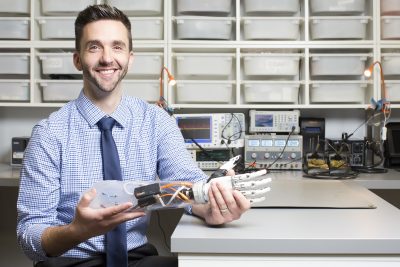A Chicago Startup with Roots at UNB
Author: Engineering Alumni Office
Posted on Nov 28, 2017
Category: Alumni Spotlight
Photo by Kendall Karmanian via Crain's
Chicago-based Coapt is an award-winning company that provides revolutionary and intuitive myoelectric control technology for advanced prosthetic arms. The medical tech company’s pattern recognition system decodes signal patterns of muscle activity in real time, giving users complete control of their prostheses. CEO and co-founder Blair Lock (BScEE’03, MScEE’05) says the original idea behind the technology actually dates back to the 1960’s at the Institute of Biomedical Engineering at UNB. “The technology just wasn’t in place at that time to make it happen.”
Lock, along with co-founders Levi Hargrove (BScEE’03, MScEE’05, PhDEE’08), UNB Researcher Jon Sensinger, and Todd Kuiken spent years doing research and clinical work at the Rehabilitation Institute of Chicago (now the Shirley Ryan Ability Lab) and realized that the time was now right to bring the idea to life. Lock had helped grow a team of 70+ people and secured research funding and collaborations from all over the world while at the Rehabilitation Institute to help develop the field of prosthesis control, and knew that the need existed to take the revolutionary research and clinical results they were achieving to the next level.
Indeed, he’s done just that. Coapt’s technology is turning prosthetic arms and hands into better-functioning devices that amputees can operate in a similar way to their in-tact limbs–just by willing the device to move. The company’s COMPLETE CONTROL system is a non-invasive advanced control solution designed to enhance the functionality of a powered myoelectric prosthesis for those with upper limb loss or limb difference. Now, after five years in business, the company has many industry and research collaborators, including universities like UNB, and is diversifying their product portfolio and entering the global market.
Lock and his partners still work closely with UNB’s Institute of Biomedical Engineering, their efforts being closely related. “Kevin Englehart basically enrolled me into the masters program in biomed after I graduated from electrical engineering and had worked with him over the summer. I didn’t consider myself an academic; my father was an engineer and I had a preconceived idea of what an engineer was. I thought I would work at a more traditional engineering firm. But taking TME (Technology Management and Entrepreneurship) courses during undergrad and getting my feet wet in the biomed field allowed me to look at things through a different lens.”
Lock says the TME program gave him the business leadership skills he needed to succeed in the tech space. When he completed the MSc in Engineering at UNB and went to Chicago, he was able to use those skills and stay open and aware of new opportunities. He had a great team around him who were doing innovative and exciting new work. When he and his soon-to-be company partners saw a need in the market for their product, they took it upon themselves to fill it. “Without the exposure to the startup and leadership tech world that I received through TME, I may not have made the move from the hospital to the company.”
“It’s an exciting time in business and in this field right now, and I’m happy with how my engineering career has unfolded. I just wish it wasn’t so cold in Chicago!”

